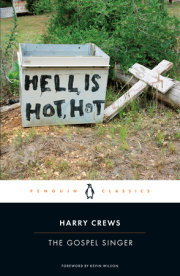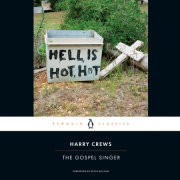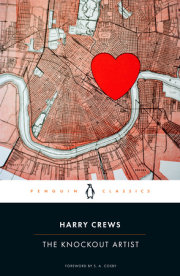Chapter 1
Enigma, Georgia, was a dead end. The courthouse had been built square in the middle of highway 229 where it stopped abruptly on the edge of Big Harrikin Swamp like a cut ribbon. From the window of the cell on the north side of the courthouse, Willalee Bookatee Hull could see the whole town. He swayed gently, shifting his weight from one foot to the other. Behind him on a wooden table a plate of peas was congealing in a gauze of pork fat. Two biscuits lay at the side of the plate. There was a slop bucket in one corner of the cell and above it at eye level a sheet of tablet paper on which someone had written in pencil the regulations of the Lebeau County jail.
Willalee Bookatee, in the breathless heat of the cell, swung before the brilliant square of windowlight like the pendulum of a clock. There was no sound except the steady drone of flies, stuck and sticking on the gummy edge of the plate behind him. The sun was in the west, dividing the street between shadow and light. At the far end of town where highway 229 burst free into the flat burning countryside, a mule was hitched in the sparse shade of a chinaberry tree. It was asleep under a wooden saddle and bloodfat flies swarmed languidly over it. On the sun side of the street, a 1948 Buick with a foxtail on the aerial and a Go Navy sticker in the rear window was parked in front of Marvin's Drugs, which was also the United States Post Office where a flag hung from an aluminum pole. The Buick was the only car in the street. It had not rained in two months.
Willalee Bookatee rocked on, half-dazed and lost in a kind of sleep, watching not the farmers or their hitched mules, but rather the tan canvas banner with red, white and blue lettering that stretched across the street. Anchored at one end to Harvey's Seed store and at the other end to Enigma Funeral Parlor, the banner read: welcome home gospel singer! Even though Willalee Bookatee was a preacher of the Gospel, with huge pieces of Scripture memorized, he could not read, but he knew-just as every living soul in Enigma knew-the Gospel Singer was coming home. They had prepared for it, looked forward to it, prayed for it. An unabated hunger raged in the whole town for the sight and the sound and-God willing-the touch of the Gospel Singer, who had single-handedly focused the attention of the world on Enigma, Georgia. The Gospel Singer had given their lives purpose and meaning simply because they could say "I come from the town where the Gospel Singer was born," or "I known him when he weren't nothin but a boy."
Willalee had watched the Gospel Singer time after time on the Muntz television that he had bought in Albany, Georgia, and brought home on the back of a turpentine wagon and set up in his cabin. Now the Gospel Singer was coming home again! He would be here, he would, in this very Enigma! He was going to walk again in that fine tall blond body, a body so fine and tall and blond that it insulted the clothes that covered it, no matter how expensive and tailored the clothing was. And of course the clothing had become more and more expensive as the Gospel Singer had gone from the television studio in Albany to the one in Tallahassee to the one in Atlanta to the one in Memphis to the one, finally, in New York City.
When Willalee Bookatee turned on that Muntz television and the Gospel Singer's voice slipped out into his cabin, it was balm poured into a wound. Nothing mattered. The world dropped down a great big hole. Everything-whether it was a razor cut, or a tar-scalded eye, or a burning case of clap off a Tifton high-yellow whore-everything quit but that voice and it went in his head and down his flesh to where his soul slept. And he could stand whatever it was for another week.
The white folks talked of nothing else. In the fields chopping cotton or breaking corn or sitting on the bench in front of Enigma Bank whittling tobacco plugs and spitting between their feet, the Gospel Singer was never far from them. Willalee Bookatee had once heard one of them say that the Gospel Singer carried enough clothes in the trunk of his car to put something on the back of every person in Enigma. Willalee Bookatee had seen the car, and it was big, but he knew that there couldn't be something in there for everybody in Enigma. And yet he believed it. Knowing had nothing to do with it. It was not impossible because he was the Gospel Singer, because everything turned to gold under his hand, the same as common air changed to angelmusic in his mouth. Yes sir! Albeeny, Tallerhassee, At-lanter, Memfis, Nu Yawk City. He had heard the white folks say the names so often they rang in his head like a bell. And he was glad to be able to sing them out-clicking over his tongue as a prayer wheel-just as everyone in the town was glad, because wherever the Gospel Singer had ultimately gone, he had started in Enigma, Georgia. Their Enigma. He had sprung from them and that was their pride. Out of their blanched flesh and hookwormed children and leached soil and poor-bone cattle-so starved that when they were murdered every winter at butchering time, their cut throats would not bleed a puddle larger than a lady's handkerchief-out of all the ills and evils of their world he had burst forth full as the sun and beautiful. Out of them, out of their kind, he had come, with nothing to foreshadow him or explain him. And every single soul felt, just as Willalee Bookatee felt, that someday in some mysterious and instantaneous way the Gospel Singer would save them from the tragedy that was Enigma.
He dropped his eyes from the banner and let his sight sift out through slitted lashes. Heat rose out of the earth distorting the town. Up and down the entire length of Enigma nailed onto posts and into the storefronts were red posters proclaiming freak fair ** children under five admitted free ** come one come all *** see the midget with the largest foot in the world. The very night after the Gospel Singer's welcoming banner had been put up, the red posters had appeared. That was the day before they had put Willalee Bookatee in jail and he got Uncle Judge, who was a Nashville nigger and could read and write, to tell him what the sign had said, and after he heard about the midget with the foot, he made up his mind right then and there to spend a dime or whatever amount of money it cost to see it. But as it turned out, he did not even get to see where they were putting up the fair tents. And the way it looked now, he never would see that midget's foot.
Willalee Bookatee felt himself the center of a mystery. Nothing was the same as it had ever been, and nothing would ever be the same again. He was a stranger to himself. He would stare at his hands and shake his head. He would get on his knees, and he, a preacher, could not pray. The nearest to prayer he could come was to take a picture out of his back pocket and carefully unfold it and there on his knees look upon it until the agitation went out of his heart and he was calm. He had cut the picture out of a magazine that Miss MaryBell Carter had bought for him in Tifton. It was of the Gospel Singer, his beautiful white hands raised, his golden head dropped back and his mouth open, singing. And so in the middle of the night with the moon patterned by the barred window he would remain for hours on his knees before the picture, not praying but calm as prayer in a mindless wonder at what he had done. At times he would whisper, "Murder? Me a murderer?" and the mystery would swell before him as bottomless as night.
From as far away as Willalee could see now, a pickup truck was growing out of the black surface of highway 229. It caught and held the arching sun in little bursts of light. He watched it dreamily, indifferently glad for something new to look at because Enigma was only eight blocks long and during the three days he had been in the courthouse cell, there had been nothing to do but look at it. The first two days were not so bad because everybody in Enigma had come by the courthouse to see him, usually stopping by the funeral parlor first. A few people had even driven all the way over from Tifton, where highway 229 turned off U.S. 41, to have a look at him. There had been a steady stream of people between the parlor and the courthouse; and the sheriff, a fat man with one lung, had his wife make up sandwiches and coffee to sell. It had caused a great noise in and around Enigma, almost-some were heard to say-threatening to confuse and delay the homecoming plans for the Gospel Singer. But business had fallen off as suddenly as it had begun. Enigma quickly adjusted itself to Willalee Bookatee Hull and the visitors had become fewer and fewer.
The pickup truck backfired into the street and hissed to a stop in front of the courthouse, not thirty feet from where Willalee stood. A tall, bloodless boy with chalky skin and hair the color of milk got down from the cab of the truck and stood squinting under the shade of his thin, paper-like hands. He looked up briefly at the sun, his jaw dropping suddenly showing tongue and teeth the color of mildew. Gnats swarmed at an open sore the color and size of a grape on his cheek. He looked up at Willalee, who looked away to the smoking horizon and gripped the solid warm bars more tightly. When Willalee looked back the boy was gone and before he could raise his eyes to the horizon again he heard the whiny voice of the Gospel Singer's brother, Gerd. The door opened behind him, but Willalee kept looking down the far line of highway 229 where it
formed finally a daggerpoint that lay against the base of the sky.
"She's a sight, hey?"
"A mess, shore."
The voices rose behind him, with only a rough asthmatic wheeze to distinguish the sheriff's from Gerd's. The muted jangle of keys on the brass ring on the sheriff's belt punctuated the pauses as he caught his breath.
"Is he stay there lookin out the winder all the time?" asked Gerd.
"Most all the time."
"How come you reckon?"
"More'n likely lookin at the funeral parlor. Just thinkin about that white ass he got."
"That nigger got him some shore when he decided to git it."
Willalee listened and gripped the bars more tightly. The most frightening aspect of his crime was that everyone in Enigma had apparently forgotten his name. He had suddenly become "the" nigger or "that" nigger, but never Willalee Bookatee Hull. He had grown up with Gerd, lied to him, worked for him or at least for his daddy, and stolen from him. Yet here Gerd was, just like everybody else, forgetting his name. And as for him standing there thinking about her white ass, he was not. He had never, so far as he knew, thought about Miss MaryBell's ass. Rather his eyes were riveted on the road out of which sooner or later the enormous black car carrying the Gospel Singer would rise. His only hope now was that the Gospel Singer would come before they hanged him.
"Coulda been worse. Coulda used a razor," the sheriff was saying.
"You right. A razor's messier'n a ice pick. But the ice pick's messy enough the way he used it. All them little purple holes," said Gerd.
"It didn't help her looks none."
"Did they ever settle for shore how many times he got her?"
"Sixty-one," said the sheriff. "Hiram wrote it on a pasteboard and put it in the winder. People coming to the funeral parlor kept on askin what the nigger done to her and Hiram got tired of sayin it so he wrote everythin the nigger done to her on a pasteboard and put it in the winder. You can read it yousef. Sixty-one."
"I'm goin back over there to look at that poor Christian girl," said Gerd. "I couldn't git no fitten look at her with all them people that's been over there."
"A virgin too," the sheriff shook his head sadly.
"The nigger struck a innocent shore when he struck MaryBell. If ittas one thing Enigmer knowed, ittas that."
"Do the Gospel Singer know?" asked the sheriff.
"Ma sent a telegram," said Gerd. "But you caint ever know when he's gone git what you send him. He's in one place yesterday and in another one the day before."
"It's gone be hard for him, coming home to that," said the sheriff.
"Well it happens."
"It shore does."
"The Lord works in mysterious ways," said Gerd. "Ittas a blessin he killed her, I guess. Now she don't have to suffer the rest of her days with everybody in Enigmer knowin she lost her flower to the nigger."
A match struck against the cell door. Willalee smelled the faint wisps of Prince Albert tobacco. His mouth watered. They had taken him out of his bed at three o'clock in the morning and brought him to jail without tobacco, and since no Enigma Negro had dared visit him, it was now three days since he had had a smoke. And to take his mind off the delicious cigarette, he tried once again to remember the ice pick and how he had come to have those incredibly bright splashes of blood over his clothes. He did have an ice pick. He kept it stuck into a two-by-four above the washtub that served as his refrigerator and held a ten-cent cake of ice wrapped in a croker sack. And that was where they found it. Stained with the same bright blood. And his right hand, when they dragged him naked and screaming from his bed, had been a solid glove of blood from wrist to finger tip. And she was there too, unstrung at the foot of his Muntz, her head turned off at a funny angle and something that was not a smile in her face and blood from her punctured neck vein framing her hair like a halo.
Copyright © 2022 by Harry Crews. All rights reserved. No part of this excerpt may be reproduced or reprinted without permission in writing from the publisher.










